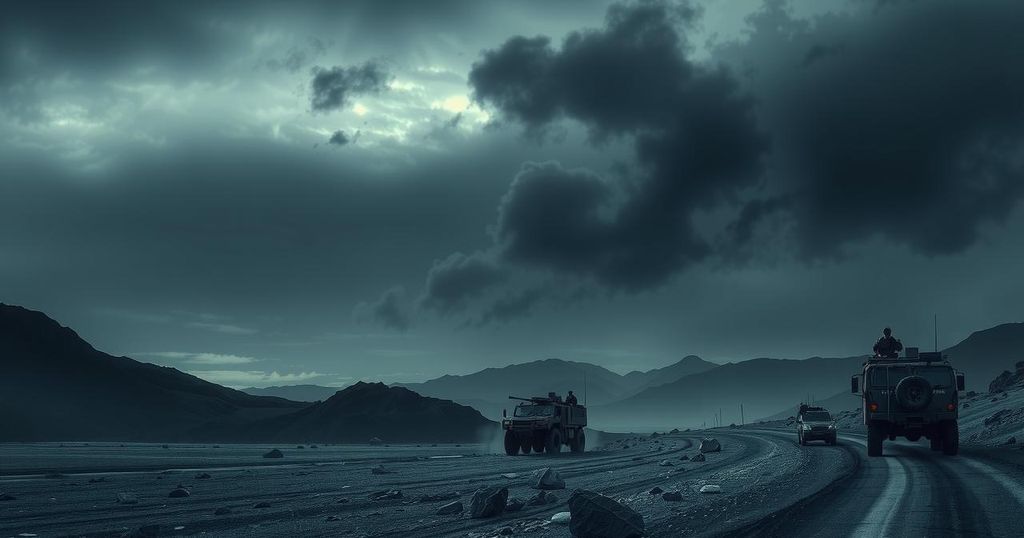The M23 armed group and Rwandan forces launched an offensive in eastern DRC ahead of a crisis summit, leading to increased violence and a reported death toll rising to 2,900. With the international and regional communities focused on responsive measures, there is skepticism about the likelihood of achieving lasting peace amidst entrenched conflict and humanitarian issues.
On Wednesday, the M23 armed group, along with allied Rwandan forces, initiated a new offensive in eastern Democratic Republic of Congo (DRC), ahead of a crisis summit involving the Rwandan and Congolese presidents. This confrontation follows the M23’s seizure of Goma, where the UN reported a significant death toll increase, with at least 2,900 casualties from recent fighting as opposed to an earlier count of 900.
After declaring a unilateral ceasefire that was meant to take effect on Tuesday, the M23, supported by Rwandan troops, captured the mining town of Nyabibwe, escalating their advance toward Bukavu, the provincial capital. Intense clashes arose early Wednesday, confirming concerns over the ceasefire’s legitimacy, as Congolese government spokesman Patrick Muyaya labeled it a deceptive maneuver.
The persistent conflict over three years between the Rwandan-backed M23 and the Congolese military has seen multiple ceasefires declared, only to be broken swiftly. In light of the current crisis, Rwandan President Paul Kagame called for de-escalation during a discussion with European Council chief Antonio Costa, indicating a mutual agreement on the need for effective resolutions for lasting peace.
The upcoming summit in Dar es Salaam, involving President Kagame and DRC’s Felix Tshisekedi, aims to address the escalating violence. A day prior to this summit, the UN Human Rights Council will hold a special session at Kinshasa’s request to deliberate on the ongoing crisis.
The capture of Goma marked a critical point in the enduring conflict in mineral-rich eastern DRC, which has faced persistent violence for three decades. According to the UN peacekeeping mission, the death toll in Goma is significant, with Vivian van de Perre reporting 2,000 bodies found on the streets and 900 more in local morgues, highlighting the severity of the situation.
Residents of Bukavu, apprehensive about becoming the next target, gathered for a prayer service organized by local women seeking peace. Attendees expressed their weariness with perpetual conflict, emphasizing a collective desire for stability and an end to violence, as articulated by participant Jacqueline Ngengele.
Regional entities, alongside international bodies such as the UN and EU, are engaged in diplomatic efforts aimed at finding peaceful solutions to the crisis. Nonetheless, DRC’s Foreign Minister Therese Kayikwamba Wagner criticized the international community, claiming there is a disconnect between declarations and tangible actions on the ground to address the escalating violence.
Countries bordering the DRC have taken measures to strengthen their defenses in response to the crisis, with concerns over potential spillover effects. Reports indicate that Rwanda has bolstered its military presence in the DRC, particularly to gain access to vital mineral resources, while denying direct military involvement with the M23, despite evidence suggesting otherwise.
The conflict in eastern Democratic Republic of Congo involves the M23 armed group, which has been reportedly supported by Rwanda. This area has experienced over three decades of turmoil due to the presence of numerous armed factions vying for control over the region’s rich mineral resources, such as coltan and gold. The international community has expressed concern over the escalating violence and its potential to destabilize neighboring countries.
In summary, the renewed offensive by the M23 and Rwandan troops in eastern DRC underscores the fragility of the situation amidst ongoing violence and humanitarian crises. With the rising death toll and regional tensions, diplomatic efforts are urgently necessary to prevent further escalation. The upcoming summit may provide a platform for addressing these critical issues, yet skepticism remains regarding the effectiveness of international responses to the conflict.
Original Source: homenewshere.com






